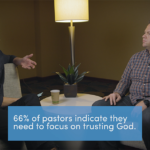
Should you focus on the people leaving, staying, or coming into your church? And how do you care for your church during shifts in attendance?
By Aaron Summers
Lifeway Research recently released a study on why people change churches and found church switchers fall into two main buckets. Those who switch churches either change because of a residential move (60%) or for various other reasons (40%). Friend, there is nothing you can do about those who move because of family or work-related issues. You care for them. You miss them. Yet, they are gone.
However, the other 40% need attention. What does this mean for the pastor? Should you focus on the ones leaving, the ones staying, or the ones coming into your church? The short answer is everyone. However, let me share how we as pastors can CARE during these shifts in attendance.
Clarity
It is important to provide clarity regardless of who the person is in your church. More than 4 in 5 regular churchgoers who have changed churches (86%) state a church’s beliefs are important to them. So churches need to be clear about what they believe. Pastor, you likely think it is already clear, but it isn’t. Make sure your beliefs are publicized on your website so anyone can review them. Those looking for a church home will look over your website.
Publicizing beliefs is just one area of clarity. Pastor, we need to be clear from the pulpit. Good preaching is good communication. If we become confusing in the pulpit, people lose loyalty. However, the crystal clear but angry or hateful will lose people too. Communication is about the giver and receiver.
“Churches need to be clear about what they believe. You likely think it is already clear, but it isn’t. Make sure your beliefs are publicized on your website so anyone can review them.” — @aaronwsummers Click To TweetA final thought about clarity is that our churches need a clear directive. Yes, we have the Great Commission, and we must be seeking to make disciples. However, Millennials and Gen Z, especially, want to know how that is being lived out in two contexts: the great commandment and the local community. It is not enough for us to espouse evangelism. We must actively engage our local context with evangelism that loves our neighbors.
Authenticity
Having authenticity has always been important. The church is called to not only share the truth of Jesus but also to embody the truth of Jesus. Authenticity is about faithfully resembling the original. Of those looking for a church, 84% say authenticity is important. We cannot have hidden agendas or secrets. We have the wonderful news of Jesus to share. But we also have issues that need handling.
Millennials and Gen Z see the issues and would like an explanation. Pastor, we must begin honestly expressing, without glamorizing, and confessing our corporate and personal sins to regain trust. When we humbly share our struggles and remove masks, we endear people. When we step down from the pedestal and speak directly from a pure motive of love, we become more authentic. We must stop with the plasticity and become more real.
“When we step down from the pedestal and speak directly from a pure motive of love, we become more authentic.” — @aaronwsummers Click To TweetRelationships
We are wired for relationships. From Adam needing Eve to everyone in your community, we all need relationships. Lifeway Research found 4 in 5 churchgoers felt relationships were important or extremely important when it comes to caring for the community (82%) and unity among members (82%). In November 2023, the World Health Organization stated that loneliness was a global health priority. It is true in your community as well. Those who are leaving your church do so for various reasons, but relationships—or a lack of them—are a significant factor. Using a small group system increases the ability to engage people in relationships. Encourage your leaders to make this a priority in the coming year. As important as teaching is, relationships are also vitally important.
Another way to inspire relationships is to have multi-generational involvement from the parking lot to the pulpit. Churchgoers say building relationships with members is at least an important factor in their decision to attend a church (76%). And guests need to see people with whom they can build relationships.
Nearly 4 in 5 (79%) of those who have switched churches agree that how the church welcomed visitors positively impacted their decisions to attend regularly, with 49% strongly agreeing and 30% somewhat agreeing. They need to see someone like them. Or possibly, someone with whom they want to relate. Utilizing more people along the welcoming chain provides many touches and opportunities. It is important for churchgoers and visitors to see every generation on the stage. Show them what you want to be. Even if your church only has a few kids right now, consider how they can read, welcome, smile, and say hi as well as anyone else.
“Those who are leaving your church do so for various reasons, but relationships—or a lack of them—are a significant factor.” — @aaronwsummers Click To TweetEngagement
Of all the ways to track statistics, do you track engagement? Attending church should not be an end in itself. We are called to make disciples, and engagement is a critical component. Where can regular attendees serve? Where can guests serve? These are important engagement questions that church leaders don’t usually answer. But they can make the difference between someone staying and someone leaving your church. Consider adopting a stepping stone approach to service in your church.
Certainly, personnel, stewardship, and nominations will be vetted by members. But how might we involve regular attendees and guests in serving at outreach events and in ministry areas? We need to engage people in ministry. And serving alongside other members helps them build relationships and solidify the desire to stay with the local church.
You could establish this approach with two engagement goals. For example, the first goal could be having 50% of worship attendance engaged in discipleship. Offer small groups and one-on-one discipleship to reach this goal. The second goal could be having 50% of worship attendees engaged in community ministries. Notice that the goal is based on worship attendance because we want to provide avenues of engagement for everyone.
People are going to move, and you can’t control it. For the rest who might be leaving your church, we need to raise our focus and efforts. Consider how clear you really are by getting someone to review your website and church. Bring someone in like a mystery shopper to analyze various aspects of your church. This provides excellent data for you to discuss with your lead team. Building an authentic, relational, and engaging culture takes time and might prove to be elusive. I recommend Culture Shift, Culture Making, Change the Culture, Change the Game, and Building a Discipling Culture for deeper research into adjusting these areas to increase your care for your people.

Aaron Summers
Aaron serves as the pastor of First Baptist in Crowley, Texas, as a church consultant with Texas Baptists and owns RestoringSignificance.com, an organizational coaching company. He and his wife Dulcie have two kids in college and enjoy traveling in their RV.
For permission to republish this article, contact Marissa Postell Sullivan.












